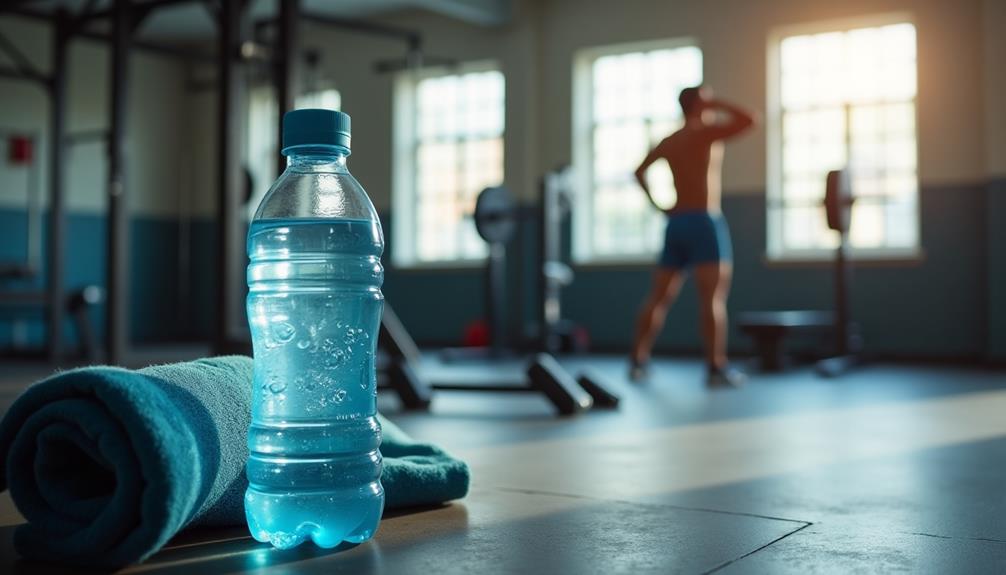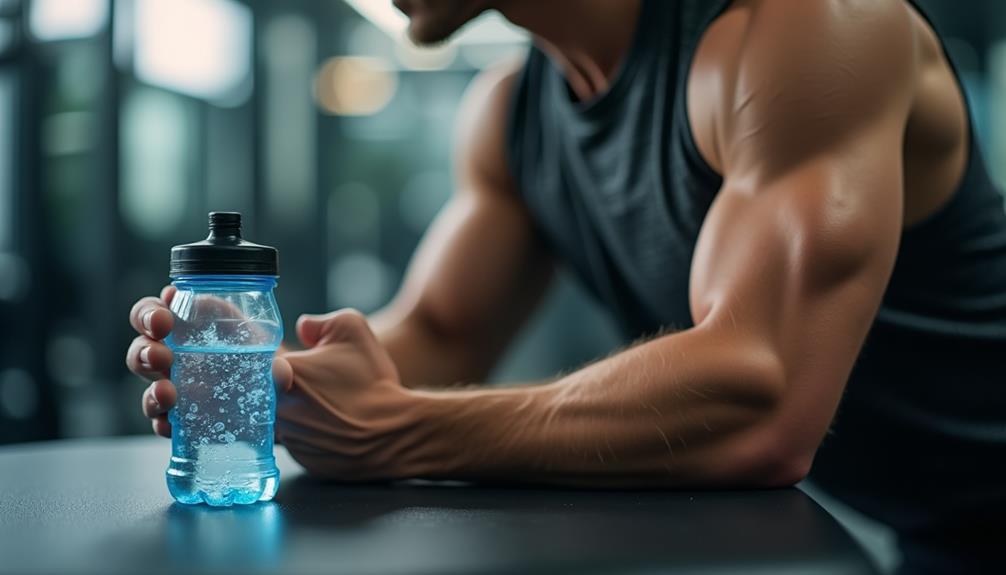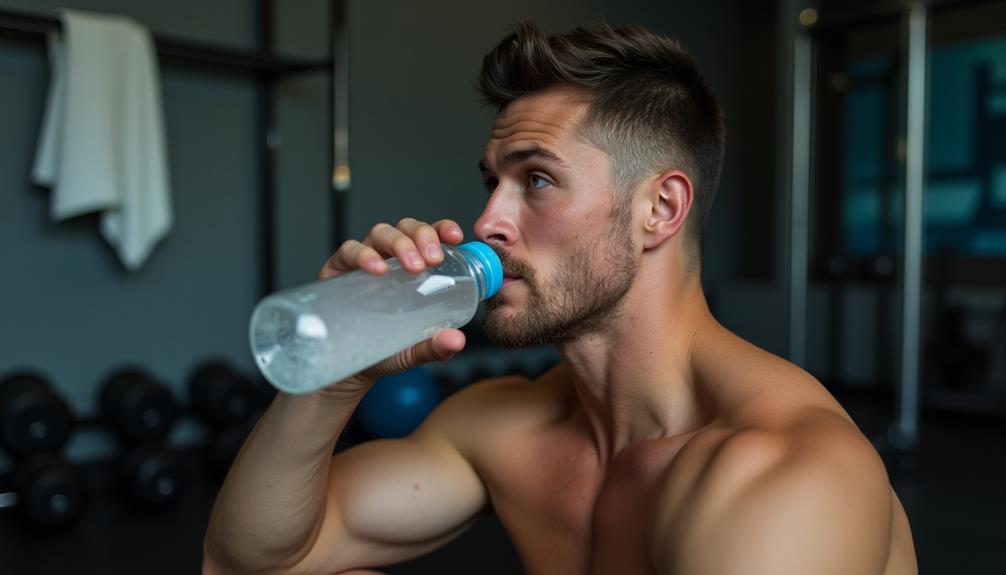Hydration is essential for your muscle recovery after intense workouts. When you stay hydrated, your body efficiently transports nutrients to your muscles for repair and growth. Dehydration, on the other hand, can slow recovery, increase fatigue, and lead to muscle cramps. By maintaining fluid balance, you support essential processes like waste removal, which helps reduce soreness. Electrolytes also play a significant role by regulating fluid balance and aiding muscle function. To optimize your recovery, establish a hydration routine, listen to your thirst signals, and replenish fluids post-exercise. Understanding these elements can enhance your overall recovery experience.
Core Insights
- Hydration aids in transporting nutrients to muscles, essential for repair and growth post-exercise.
- Proper hydration helps regulate body temperature, reducing fatigue and enhancing performance.
- Dehydration increases fatigue and slows recovery from muscle strains and soreness.
- Electrolytes play a crucial role in fluid balance, supporting muscle function and preventing cramps.
- Consistent hydration practices improve overall recovery efficiency and prepare the body for subsequent workouts.
The Importance of Hydration

Staying hydrated plays an important role in muscle recovery after intense workouts. When you exercise, your body loses fluids through sweat, which can lead to dehydration. Keeping your hydration levels up helps maintain top performance and aids recovery. Water transports nutrients to your muscles, promoting repair and growth. It also helps regulate body temperature, preventing fatigue. Coconut water, rich in natural electrolytes, can be an excellent addition to your hydration routine, offering potassium and other essential minerals for muscle function.
To ensure sufficient hydration, drink water before, during, and after your workout. Aim for at least half your body weight in ounces daily. Incorporating electrolyte-rich drinks can also be beneficial, especially after heavy sweating. Remember, hydration isn't just about quenching thirst; it's a crucial part of your recovery process. By prioritizing your hydration, you set the foundation for stronger, healthier muscles.
How Dehydration Impacts Recovery

- Increased fatigue: You'll feel more tired than usual, making it harder to bounce back. Proper hydration is essential for maintaining energy levels and peak performance during workouts and recovery periods.
- Reduced performance: Your muscles won't function at their best, impacting your next workout.
- Slower recovery: Healing from strains or soreness takes longer when you're dehydrated.
- Cramping: Lack of fluids can lead to painful muscle cramps, interrupting your training routine.
Muscle Repair and Fluid Balance

How important is fluid balance for muscle repair? Fluid balance plays an essential role in the recovery process. When you exercise, your muscles undergo stress and minor damage, requiring repair. Adequate hydration helps transport nutrients to your muscles, facilitating recovery. Water aids in the removal of waste products generated during exercise, reducing soreness and speeding up healing. Electrolyte replenishment is also important for maintaining proper fluid balance and supporting muscle function during recovery.
If you're dehydrated, your body struggles to maintain ideal circulation and nutrient delivery. This can delay muscle recovery and lead to prolonged fatigue. Additionally, staying hydrated supports overall cellular function, which is crucial for muscle repair.
In short, maintaining proper fluid balance is necessary for efficient muscle repair and overall recovery, ensuring you bounce back stronger after each workout.
Role of Electrolytes in Recovery

- Sodium: Regulates fluid balance and prevents dehydration. For best hydration and muscle recovery, electrolyte gummies can be an effective and convenient option to replenish essential minerals.
- Potassium: Supports muscle contractions and helps prevent cramping.
- Calcium: Essential for muscle contraction and relaxation, facilitating proper movement.
- Magnesium: Aids in muscle recovery and reduces soreness by relaxing muscles.
Hydration Strategies for Athletes

After understanding the pivotal role electrolytes play in recovery, it's clear that hydration strategies are just as important for athletes aiming to optimize performance. Start by establishing a hydration routine. Drink water consistently throughout the day, not just during workouts. Aim for half your body weight in ounces daily. During intense exercise, consider electrolyte-rich drinks to replenish lost fluids.
Pre-hydrating before workouts is key, too. About 16-20 ounces an hour before exercise can enhance performance. Post-exercise, focus on rehydrating within 30 minutes. Finally, listen to your body. Thirst is a signal, but don't wait to feel thirsty before drinking. By implementing these hydration strategies, you can support muscle recovery and maintain your performance levels effectively.
Signs of Dehydration

- Increased thirst – You feel a constant dry sensation in your mouth.
- Dark urine – Your urine appears amber or darker instead of light yellow.
- Fatigue – You experience unusual tiredness or sluggishness during workouts.
- Dizziness – You feel lightheaded or unsteady, especially when standing quickly.
Being aware of these signs can help you take action before dehydration impacts your muscle recovery. Staying hydrated is essential not just for performance but also for your overall health. Keep an eye on how you feel to make sure you're always at your best.
Hydration Guidelines for Optimal Recovery

Proper hydration is essential for your muscle recovery, and knowing how much to drink can make all the difference. Aim for at least half your body weight in ounces of water daily. For example, if you weigh 160 pounds, aim for 80 ounces.
If you've exercised intensely, increase your intake to help replenish lost fluids. Monitor the color of your urine; it should be light yellow. Darker urine signals dehydration, so drink more.
Additionally, consider electrolyte drinks after prolonged workouts, as they help restore essential minerals lost through sweat.
Timing Your Fluid Intake

Consistently timing your fluid intake can greatly enhance your muscle recovery. Proper hydration isn't just about drinking water; it's about when you drink it. Here are four key times to focus on:
- Before Exercise: Hydrate 1-2 hours prior to your workout for best performance.
- During Exercise: Sip water regularly, especially during prolonged or intense sessions, to maintain hydration.
- Immediately After Exercise: Replenish lost fluids within 30 minutes post-workout to kickstart recovery.
- Throughout the Day: Keep your water bottle handy to drink consistently, ensuring you're well-hydrated before your next workout.
Hydration Myths Debunked

Many people believe common hydration myths that can hinder their muscle recovery and overall performance. One myth is that you only need water when you're thirsty. In reality, thirst isn't always a reliable indicator of hydration needs, especially during intense workouts. Another misconception is that sports drinks are necessary for all athletes. Unless you're exercising for over an hour, plain water is typically sufficient. Additionally, some think that consuming large amounts of water can prevent dehydration. However, overhydration can lead to imbalances in electrolytes, which are vital for muscle function. Finally, it's a myth that hydration doesn't affect recovery. Staying properly hydrated supports nutrient transport and aids in muscle repair, making it essential for best recovery.
Frequently Asked Questions
Can Hydration Improve Overall Athletic Performance Beyond Muscle Recovery?
Staying hydrated boosts your endurance, enhances focus, and prevents fatigue during workouts. When you're well-hydrated, you'll perform better, recover faster, and reduce the risk of injuries, ultimately leading to improved athletic performance.
How Does Age Affect Hydration Needs for Muscle Recovery?
As you age, your hydration needs shift like the changing seasons. Older bodies may require more water to support muscle recovery, as they often lose thirst sensitivity and have decreased muscle mass affecting overall hydration balance.
Are There Specific Drinks Better for Hydration During Recovery?
When it comes to hydration during recovery, sports drinks with electrolytes can be beneficial. However, water's often sufficient. You should focus on your body's signals and choose what feels right for you after exercise.
Is There a Difference Between Hydration for Endurance vs. Strength Training?
When you train for endurance, you need to replenish electrolytes and fluids lost over time. For strength training, focus on hydration to support muscle function and recovery. Both require attention, but the approach can differ.
How Does Climate Impact Hydration Needs for Muscle Recovery?
Climate greatly impacts your hydration needs. In hotter conditions, you sweat more, losing fluids rapidly. You'll need to drink more water to replenish what you lose, ensuring your body stays primed for effective muscle recovery.

